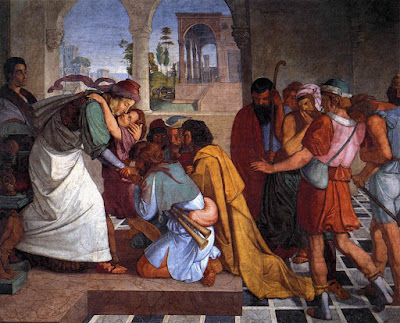(Optional Memorial for Saint Henry)
 |
| “The Recognition of Joseph by his Brothers” by Peter Cornelius, 1816-17 |
Commentary:
Reading 1: Genesis 44:18-21, 23b-29; 45:1-5
Commentary on Gn 44:18-21, 23b-29; 45:1-5
Joseph punishes his bothers for having sold him into slavery by tricking them into bringing Benjamin their youngest brother, who had taken Joseph’s place as the apple of his father’s eye. When he confronts them and sees their willingness to protect and save Benjamin, he reveals himself to them. Joseph tells his brothers that, in selling him to Egypt, they did God’s will since through him many lives were saved.
-----------------------------------------------
Responsorial Psalm: Ps 105:16-17, 18-19, 20-21
R. (5a) Remember the marvels the Lord has done.
or:
R. Alleluia.
Commentary on Ps 105:16-17, 18-19, 20-21
Psalm 105 is a historical hymn that recalls, in this selection, the Genesis story (Genesis 37:3ff), speaking of the fate of Joseph in Egypt and how God rescued and supported him in his slavery. It also recounts the actions of Joseph’s brothers, selling him into slavery in Egypt and speaks of the rise of Joseph in the house of Pharaoh.
-----------------------------------------------
Gospel: Matthew 10:7-15
Commentary on Mt 10:7-15
The instructions to the Apostles, as Jesus sends them on their mission to proclaim the Kingdom of God, are given. They are to go into the world without any provisions, and will depend upon the generosity of others. The Lord gives them authority over all manner of diseases and afflictions, but reminds them that they are not to request payment for these gifts of healing.
The Lord's instructions end with a warning to those who reject the proclamation of the Kingdom of God. Jesus tells the Apostles that those who reject the peace they offer will suffer, as those cut off from God's grace by the judgment laid upon the ones who perished in the destruction of Sodom and Gomorrah (see Genesis 19:1-26).
CCC: Mt 10:5-7 543; Mt 10:8 1509, 2121, 2443; Mt 10:10 2122
-----------------------------------------------
Homily:
"What eye has not seen, and ear has not heard, and what has not entered the human heart, what God has prepared for those who love him" (1 Corinthians 2:9). St. Paul paraphrases the Prophet Isaiah (Isaiah 64:3, 65:16) with these words and summarizes the lesson we take from sacred scripture at numerous points. We see evidence of how this comes to pass in the story that continues to unfold in Genesis.
We are all familiar with the story of the sons of Jacob, how they sold their brother Joseph into slavery, and then told their father he had been killed. In the first reading, we hear how their actions, as ignoble as they were, were used by God for the salvation of many, including those envious and mean-spirited brothers.
The scenario has a familiar ring to it, does it not? Even in our own lives, don’t we have a saying that “God never closes a door but that he opens a window?” In this case God has set Joseph in a place where he can dispense food to those who might otherwise starve due to famine. (If we really want to get twisted around we could ask: “Did God cause the famine so the brothers of Joseph would be forced to ask him for food, thereby exposing their evil deed and bringing salvation to Jacob at the same time?") It is frequently the case that when we attempt to understand God’s plan, we find ourselves questioning his motives (look at the passion of Christ for example). At some point, it is better to look at the end results and see how it all fits together.
The lesson of faith we learn is again summarized in St. Paul’s statement: we cannot conceive of what God has planned for us. We are called to accept the following: First, we accept that God loves us and has given us what we need to accomplish his will. Second, he created us for a reason he gives our lives purpose.
One of those “purposes” is implied in the Gospel from St. Matthew. We are called by Christ and we are sent, armed with the Holy Spirit, into the world to proclaim the Good News. It may be by word spoken or example lived, but it goes hand in hand with the call we received with our Baptism, Confirmed in the Holy Spirit, and reaffirmed in the Eucharist we share.
There may be those among us who say: “But I cannot do this. I am shy or I am too old or too young or weak.” We come back once more to St. Paul’s use of Isaiah’s prophecy. We cannot know God’s ultimate purpose, any more than Joseph did when he was sold into slavery, or the Apostles did when they were called away from their fishing nets. We do not know what God has prepared for those who love him. In that love, we can only accept his call and marvel at the wondrous deeds he brings to pass.
Pax
[1] The picture is “The Recognition of Joseph by his Brothers” by Peter Cornelius, 1816-17
No comments:
Post a Comment